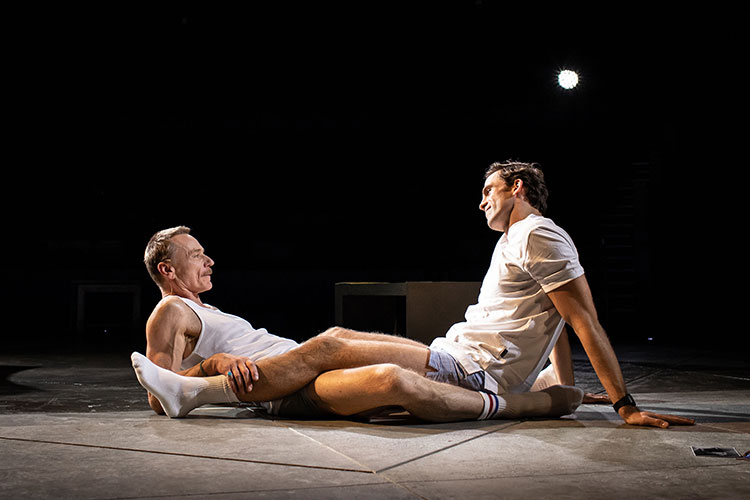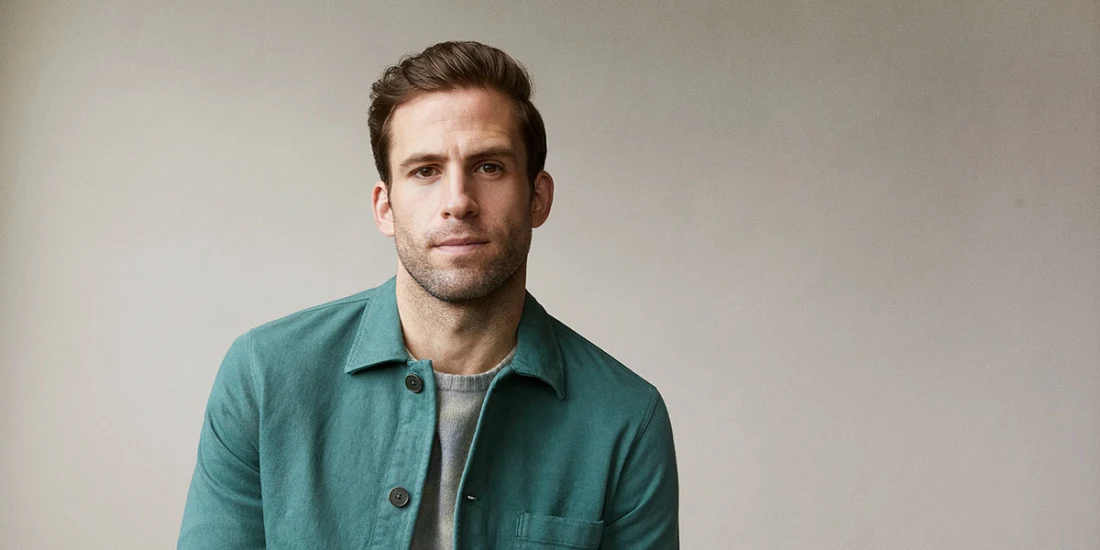Dino Fetscher on the continued timeliness of ‘The Normal Heart’
As soon as Dino Fetscher went on one of his first vacations post-lockdown, he scored an audition for The Normal Heart at The National Theatre, a play he had read in drama school and is very close to him.
"If I really want to get a job, all I need to do is book a holiday," Fetscher jokes over Zoom. "And then without a doubt, I get a job that clashes with the dates."
Fetscher ultimately landed the role of Felix Turner, a closeted reporter in 1980s New York who falls in love with Ned Weeks, inspired by the play's author Larry Kramer and played by Ben Daniels in the National production. While Fetscher had read the play and identified with the story from his own experience, he relished the opportunity to learn more about this turbulent and formative time for gay men in the '80s and '90s.
"It's just been this amazing opportunity to delve into such queer history; I feel so connected to the play as a gay person," Fetscher says. "But also, it's just really connected me, myself, Dino, to who I am a lot more. And gave me a lot more pride in where I've come from — where we come from."
The revival, directed by Dominic Cooke, is playing at the National's Olivier Theatre and features a largely queer company and cast telling Kramer's seminal story about the AIDS crisis. Fetscher hopes the story, and his character's journey in particular, shows the triumph in love and kindness in a time of division and persecution.
"There was so much hate towards us, so much animosity, so much violence, but still having that flame of belief in love and having that perseverance and courage to go towards it is something that just gives me kind of faith in humanity," he says. "But it also just reminds me of that I think queer people are incredible and what we've achieved is incredible."
We chatted with Fetscher about diving into queer history, and what this play means for today's world.
This play is set in America and focuses on the AIDS crisis there, but what is the history of that time in Britain?
There were lots of similar things that happened in terms of the stigma and the homophobia from our governments and how people were treated. I've spoken to a lot of people from New York. And I chatted to my friend, Jonathan Blake, who's the second person in the UK to be diagnosed with HIV, about his experience. And he obviously was based here. And he just said, "You were so lucky to be in the U.K. because we had a health service." So even though there wasn't any direct form of treatment in the early '80s, there was palliative care. But in America, people were often turned away or weren't able to get any treatment if they didn't have insurance. So, that was a big factor. I think it was just much, much more intense.
The play is also about the AIDS pandemic, and now that we are experiencing another pandemic. How does it feel to be telling this story at this time?
It's really interesting energetically. We're still in the midst of this, and there's still that kind of tension that is very much living in the air and between people and the uncertainty of what's happening. So I think that's definitely something people will tap into. And in terms of catharsis, something I think people will be able to relate to.
Ultimately, the biggest difference being what happened with AIDS in the '80s and the '90s, it was affecting gay men for the most part. And, it was in a much more homophobic time. And the stigma that was born as a result was just catastrophic. And the kind of the way we were treated by our own government — just disregarded and essentially completely ignored — was horrific.

What preparation did you do for the role?
I basically submerged myself in as much visual, written, oral research as I could and with people. I spoke to Jonathan. I spoke to a wonderful man called Charles Kaiser, who wrote a book called The Gay Metropolis, who worked at The New York Times at the same time in the '80s. I spoke to him about how the Times operated the homophobia with Abe Rosenthal and Arthur Sulzberger at the time.
Understanding that imaginatively is really useful. We spoke to Peter Tatchell, who's an Australian who lives here, who's a very famous activist, who's implemented some incredible change. That was very interesting in terms of understanding things from an activism point of view. We spoke to an original member of The Gay Men's Health Crisis, which is what Larry Kramer, Paul Popham, and various others set up. And that's very much what our play explores in the early '80s. That was so useful because we've got so much information about Larry.
I spoke to my friends who were positive, and their experience. It's a different time, but sadly, the stigma from the '80s and the '90s very much reverberated down to our generation. And even though there are drugs and you can lead a normal life, the shame of it and the dirtiness of it because of how it was handled very much lives today. So, understanding those kinds of experiences was really, really useful.
Do you identify with Felix at all? Are you bringing any parts of yourself to your performance?
For me, it was certainly just the courage of these people, in a time where you would be sacked in most jobs. You had to keep it a secret, had to lead these double lives. And just the courage to stand up in a time where you would be immediately ostracized from society. But to stand up and say, "Hear us, this is happening and we demand your attention." It's just amazing. And it just was just such a reminder that we really do stand on the shoulders of giants and everything we have. I can walk down the street and hold my boyfriend's hand — and don't get me wrong, of course, I still think about it. Sadly, that's just a part of being a gay person. You never don't think for a second, "Am I safe?" But it's just completely different.
And now there were laws that protect us. We can legally get married. But that didn't just come from nothing. That came from constant battles, won and lost back and forth, back and forth. And the research that we did, that I did, we did as a company, was just such a reminder of that.
In particular with Felix, he's someone who has navigated a straight life. He was married and had a child and tried to operate in the straight world and always works hard, striving to be a better person. I think he's striving for love. He really believes in love. And that for me was just something that's really beautiful.
You mentioned standing on the shoulders of giants like Larry Kramer. Do you ever stop and think about how the next generation is standing on the shoulders of what your generation as done?
Yeah. Although it was a terrible, terrible time and it was awful what was happening, there was something amazing in being so unified as a community and everyone just came together because we were fighting for our lives. And people had a real purpose to get something achieved. Lots of activists, when anti-retrovirals came in and it all kind of went away, really struggled with their identity. And I think it's interesting now with. I'm a millennial, and we have seemingly everything here. We can get married. We're protected by laws. People can't sack us, can't turn us away in properties and it's great.
But sometimes it does sadden me because I think maybe there's less of a sense of community sometimes because we don't need to be unified in something. Even though I really do believe it's an illusion that we've reached where need to go. We still have such a long way to go. And everything we have is sacred and precious and it can be taken away. It's really important for us to be really grateful for where we are and what we have, and not mope around about it. But also, we have to keep our finger on the pulse and we have to keep striving forward.
Photo credit: David Reiss
Originally published on
